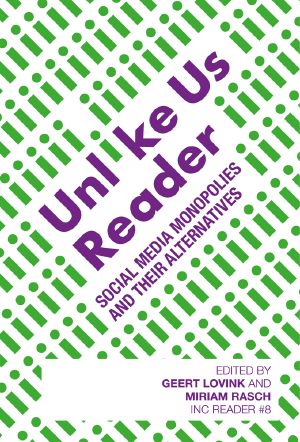Unlike Us Reader

- Authors
- Barocas, Solon & Bassett, Caroline & Bazzichelli, Tatiana & Beer, David & Berry, David M. & Bunz, Mercedes & Cabello, Florencio & Cirio, Paolo & Donovan, Joan & Doulas, Louis & Evans, Leighton & Franco, Marta G. & Gehl, Robert W. & Gürses, Seda & Haché, Alexandra & Halpin, Harry & Hardey, Mariann & Hatzopoulos, Pavlos & Hui, Yuk & Ippolita & Jurgenson, Nathan & Kambouri, Nelli & Kennedy, Jenny & Langlois, Ganaele & Lodi, Simona & Lovink, Geert & Ludovico, Alessandro & Mancinelli, Tiziana & McNicol, Andrew & Miconi, Andrea & Narayanan, Arvind & Niehaus, Wyatt & Patelis, Korinna & Rey, P.J. & Sevignani, Sebastian & Stiegler, Bernard & Stumpel, Marc & Terranova, Tiziana & Toubiana, Vincent & Troemel, Brad & Velden, Lonneke van der & Warnke, Martin & Wittkower, D.E. & Geert Lovink & Miriam Rasch
- Publisher
- Institute of Network Cultures
- Tags
- social , media , monopolies , alternatives , internet , web , online , digital , facebook , twitter , mark zuckerberg , unlike us , critique , theory , art , practice , economy , political , philosophy , social sciences , essays , network , privacy , database , web 2.0 , individuation , collective , lorea , foursquare , design , program , code , graph , business , intervention , resistance , occupy , protest , diaspora , hackers , hacking , federation , distribution , centralization , decentralization , architecture
- ISBN
- 9789081857550
- Date
- 2013-02-14T23:00:00+00:00
- Size
- 3.13 MB
- Lang
- en
The Unlike Us Reader offers a critical examination of social media, bringing together theoretical essays, personal discussions, and artistic manifestos. How can we understand the social media we use everyday, or consciously choose not to use? We know very well that monopolies control social media, but what are the alternatives? While Facebook continues to increase its user population and combines loose privacy restrictions with control over data, many researchers, programmers, and activists turn towards designing a decentralized future. Through understanding the big networks from within, be it by philosophy or art, new perspectives emerge.